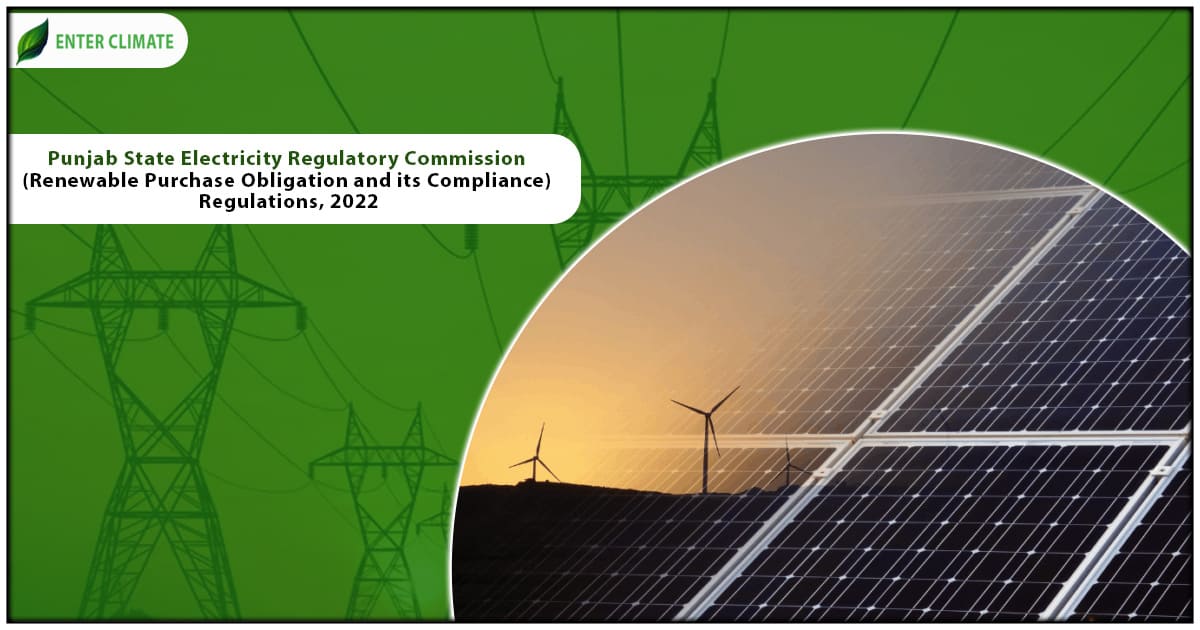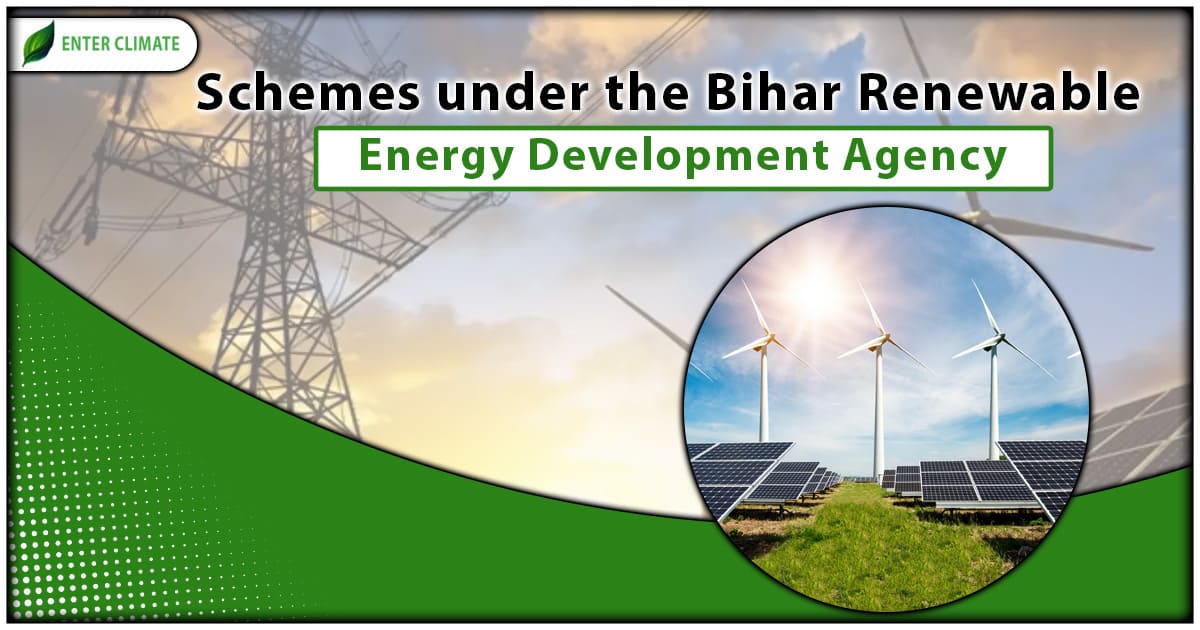Punjab State Electricity Regulatory Commission (Renewable Purchase Obligation and its Compliance) Regulations, 2022
 05 Jun, 2023
05 Jun, 2023 
The Punjab State Electricity Regulatory Commission (Renewable Purchase Obligation and its Compliance) Regulations, 2022 hold significant importance in promoting renewable energy and ensuring compliance with Punjab’s renewable purchase obligations (RPOs). The regulations mandate entities to fulfil their RPOs, and the regulations encourage the consumption of renewable energy, leading to a reduction in greenhouse gas emissions and a shift towards sustainable energy sources. They outline the obligations, reporting requirements, and penalties for non-compliance. This ensures that entities responsible for meeting RPOs are held accountable for their actions, leading to increased transparency and adherence to renewable energy targets.
Compliance/Fulfilment of Renewable Purchase Obligation
An obligated entity can meet its renewable energy consumption requirements/RPOs through various methods outlined in the Electricity (Promoting Renewable Energy through Green Energy Open Access) Rules, 2022. The methods include:
- Generating its own renewable energy or captive generation.
- Using open access to procure renewable energy from external sources.
- Requesting the distribution licensee to procure and supply the required amount of renewable energy at a tariff determined separately by the Commission. This tariff includes the average pooled power purchase cost of renewable energy, cross-subsidy charges, and service charges covering the distribution licensee’s prudent cost.
- The consumer can specify separate requisitions for solar and non-solar energy.
- Requisitions from a distribution licensee must be made for a minimum of one year.
- The quantity of energy must be pre-specified for at least one year.
- Any energy purchased from the distribution licensee or other renewable energy sources exceeding the obligated entity’s RPO will count towards the distribution licensee’s RPO compliance.
- Surplus credits in the distribution licensee’s RPO compliance can be carried over to the following year.
- The distribution licensee must provide green certificates to consumers every year for any renewable energy supplied beyond the consumers’ RPO.
- The State Agency may introduce consumer ratings based on the percentage of renewable energy purchased from the distribution licensee.
- An obligated entity can also meet its requirements by purchasing green hydrogen or green ammonia, with the quantity determined based on the equivalence to one MWh of electricity from renewable energy sources, according to the norms notified by the Central Commission.
- The obligated entity can purchase certificates following applicable regulations.
- The Central Government may determine other sources of meeting the requirements.
Data Reporting by the Obligated Entities
Each obligated entity is required to provide information about their electricity consumption and compliance with their RPO on a quarterly or annual basis to the State Agency as follows:
- The obligated entity must submit the details according to the schedule and guidelines specified by the State Agency.
- In case of any delay in submitting the required data to the State Agency, the obligated entity that is at fault must pay a late fee of Rs. 1000 per day of delay.
- The late fee should be deposited into a separate fund established and managed by the State Agency.
State Agency
The Punjab Energy Development Agency (PEDA)[1] will serve as the agency responsible for accrediting eligible entities and granting Certificates under the REC Regulations. The State Commission has the authority to establish the fees and charges that obligated entities must pay to the State Agency for its functions under these regulations.
The State Agency must operate in accordance with the directions issued by the Commission on a periodic basis. The State Agency, in consultation with the SLDC/STU and other relevant entities such as distribution licensees, will develop a suitable protocol for collecting and verifying information from various sources (e.g., RE Generating Companies, Obligated Entities, SLDC) to calculate, reconcile, and monitor RPO compliance by the Obligated Entities. The State Agency is also required to:
- Publish quarterly cumulative statements and an annual statement of RPO compliance by different Obligated Entities on its website.
- Issue notices to obligated entities who still need to submit the required data and pay the associated Late Fee as mandated in Regulation 4(2) or meet the required RPO compliance and deposit the corresponding amount as per Regulation 6(1) of the Notification.
- Provide quarterly and annual reports, including data analysis, on the targets for purchasing renewable energy to the Commission by April 30th of the following year. If necessary, the State Agency may also propose appropriate actions to the Commission to ensure compliance with the renewable purchase obligation.
Effect of default
An obligated entity that fails to meet its renewable purchase obligation (RPO) in a given year must deposit an amount equivalent to the product of the RPO shortfall and the maximum clearance price of Certificates traded in the Power Exchange during that year. The deposit must be made within 90 days after the year’s closure into a separate account managed by the State Agency.
- If there is a delay in making the deposit, a delayed payment charge will be applicable. The charge will be based on the marginal cost of funds lending rate (MCLR) of the State Bank of India for one year, as applicable on April 1st of the relevant year, plus five per cent. If MCLR is unavailable, an alternative arrangement will be used.
- Any amounts payable by the distribution licensee cannot be included in the ARR (Annual Revenue Requirement) as a pass-through.
- As per the regulations, the non-payment of late fees or amounts by an obligated entity will be considered a violation of their license or connectivity conditions.
- Upon receiving information about the default from the State Agency, the SLDC/STU and/or distribution licensee will initiate actions for violating the license or connectivity conditions. This may include the withdrawal of NOC (No Objection Certificate), permission for open access, or disconnection, following the legal procedure.
- Additionally, the Commission, either on its own or based on the State Agency’s recommendation, may take action against the obligated entity under Section 142 of the Act. Any penalties payable under these regulations or Section 142 of the Act can be recovered as per Section 170 of the Act.
- All funds the State Agency receives will be transferred to the State transmission utility (STU) every quarter.
- In cases where an obligated entity genuinely faces difficulty in fulfilling the renewable purchase obligation due to certificate unavailability or other reasons, they can approach the Commission to carry forward the compliance requirement to the next year.
- If the Commission consents to carry forward the compliance requirement, the provisions mentioned in clauses (1) to (3) of these regulations will not be invoked
Repeal and savings
- The Punjab State Electricity Regulatory Commission’s Regulations regarding Renewable Purchase Obligation and its compliance, introduced in 2011 and any subsequent amendments, will be revoked starting from the effective date of these new Regulations.
- Despite the repeal, any actions taken or believed to have been taken under the previous Regulations will be considered as if they were taken under the current Regulations.
Saving of inherent power of the Commission
- The provisions of these Regulations do not restrict or impact the Commission’s inherent powers to issue orders necessary for justice or to prevent abuse of process as outlined in these Regulations.
- The Commission is not prohibited from following a procedure that deviates from any provisions in these Regulations if, based on the unique circumstances of a specific matter or category of matters, and with written justification, the Commission deems it necessary or expedient to do so.
Power to give directions
The Commission has the authority to periodically issue practice directions and orders deemed suitable for effectively implementing these Regulations.
Power to remove difficulties
In case any challenges arise in implementing any of the provisions in these Regulations, the Commission has the power to issue general or specific orders to address the difficulties. These orders must be in line with the provisions of the Act and can involve taking any necessary or expedient actions to resolve the difficulties.
Power to Amend
The Commission may, at any time, add or amend any of the provisions of these Regulations.
Power to Relax
The Commission has the authority to relax any of the provisions outlined in these Regulations through a general or specific order. This can be done after providing an opportunity for a hearing to the parties who may be impacted. The Commission may initiate this process independently or in response to interested individuals’ applications. The reasons for such relaxation must be documented in writing.
Conclusion
The Punjab State Electricity Regulatory Commission (Renewable Purchase Obligation and its Compliance) Regulations, 2022 hold significant importance in promoting renewable energy and ensuring compliance with renewable purchase obligations in Punjab. By mandating obligated entities to fulfil their RPOs, these regulations encourage the consumption of renewable energy, reducing greenhouse gas emissions and shifting towards sustainable energy sources. They establish obligations, reporting requirements, and penalties for non-compliance, ensuring accountability and transparency in meeting renewable energy targets. It is highly recommended to take expert consultation for a clearer understanding and complying with the rules in a hassle-free manner.
Read our Article:How To Start A Renewable Energy Business In India?











